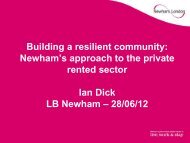View publication - Chartered Institute of Housing
View publication - Chartered Institute of Housing
View publication - Chartered Institute of Housing
Create successful ePaper yourself
Turn your PDF publications into a flip-book with our unique Google optimized e-Paper software.
PART ONE: LEARNING TODAY<br />
Understanding our ageing population and the housing options open<br />
to them<br />
The number <strong>of</strong> people aged over 65 across the UK is expected to rise from 10.3 million<br />
in 2010 to 16.9 million by 2035. 13<br />
<strong>Housing</strong> teams need a comprehensive overview <strong>of</strong> the services and options available to<br />
those in both general needs and specialist housing. The average age <strong>of</strong> social housing<br />
tenants is rising. Nearly one in three tenants are over 65 and <strong>of</strong> those, more than half<br />
live in general needs housing.<br />
What do these people want from the services they receive now and in the future? How<br />
can the housing industry <strong>of</strong>fer more flexibility and choice within the existing stock?<br />
Only five per cent <strong>of</strong> all older people live in specialist housing, including extra care<br />
housing and sheltered housing, and not all <strong>of</strong> the stock is fit for purpose.<br />
In addition, the recent English <strong>Housing</strong> Survey revealed that 58 per cent <strong>of</strong> outright<br />
homeowners are over 65 years <strong>of</strong> age. They may be in need <strong>of</strong> reasonably priced<br />
services from a trusted provider, such as a home improvement agency, to help them live<br />
independently, and/or home help or nursing services to meet increasing care and<br />
support needs at home at some point in their lives.<br />
Staff, also need to be able to <strong>of</strong>fer advice as older people and those with long term<br />
conditions make important decisions about their future housing needs and aspirations.<br />
Partnership working/joint training in an age <strong>of</strong> personalisation<br />
There is a pressing need for more joint training with health and social care pr<strong>of</strong>essionals.<br />
This will equip housing staff with the skills and knowledge to work, for example, with<br />
discharge nurses making arrangements for vulnerable adults to leave hospital. <strong>Housing</strong><br />
workers should ensure accommodation needs are considered in discharge plans for<br />
people who might require specialist housing or aids and adaptations to their homes. In<br />
other cases, poor housing (such as housing with inadequate heating or fall hazards) may<br />
have been a factor in their hospital admission in the first place.<br />
Joint training with occupational therapists (OTs) – who can be employed by both the<br />
NHS and local government – and with physiotherapists would also be invaluable for<br />
many housing staff working with older people and those with disabilities. There are<br />
already a few forward thinking housing organisations that employ OTs.<br />
44

















